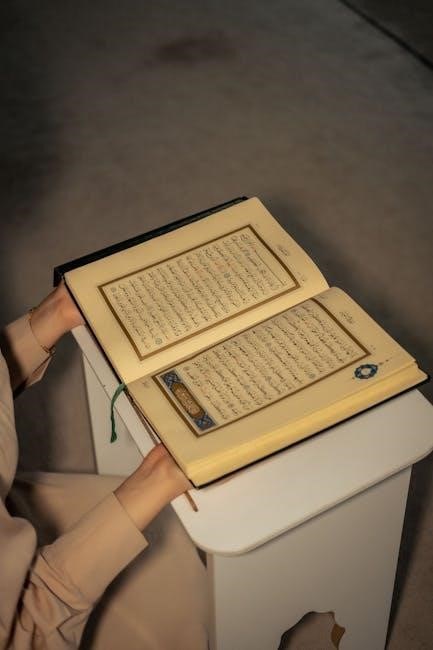
then i was guided book
Discover your spiritual journey with “Then I Was Guided.” A heartfelt guide to finding your path and inner peace.
“Then I Was Guided” by Muhammad Al-Tijani is a compelling autobiographical account of his spiritual journey from Sunni Islam to Shia Islam, exploring themes of truth, logic, and faith through personal encounters and historical reflections.
Overview of the Book’s Theme
“Then I Was Guided” delves into the transformative spiritual journey of Muhammad Al-Tijani, exploring his transition from skepticism to enlightenment. The book highlights his exploration of Islamic sects, emphasizing the role of reason, logic, and the significance of the Ahl al-Bayt. Through personal encounters and historical reflections, Al-Tijani addresses Sunni-Shia differences, seeking to bridge gaps and clarify misconceptions about Shia Islam. The narrative underscores the importance of open-mindedness and the pursuit of truth, offering a unique perspective on Islamic theology and sectarian dynamics. This autobiographical account is both a personal tale of discovery and a broader exploration of faith, identity, and the quest for understanding.
Author Background: Muhammad Al-Tijani
Muhammad Al-Tijani, a renowned Islamic scholar, was born in Tunisia and initially adhered to the Maliki school of Sunni Islam. His early education and upbringing were deeply rooted in Sunni traditions. However, his life took a significant turn during his journeys, particularly after encountering Shia scholars in Egypt and visiting holy sites in Iraq. This exposure led to his embrace of Shia Islam, transforming his spiritual and intellectual path. Al-Tijani’s works, including “Then I Was Guided”, reflect his extensive research and deep understanding of Islamic theology. His writings are characterized by a commitment to truth, logic, and interfaith dialogue, making him a pivotal figure in bridging Sunni-Shia understanding. His personal journey and scholarly contributions have left a lasting impact on Islamic discourse.

The Author’s Journey
Muhammad Al-Tijani’s journey began with a pilgrimage to Mecca, where Salafi influences shaped his views. Encounters with Shia scholars in Egypt and visits to Iraq’s holy sites led to his transformation and embrace of Shia Islam, marking a profound shift in his spiritual and intellectual path.
Early Life and Education
Muhammad Al-Tijani was born in 1943 in Tunisia into a Sunni Muslim family adhering to the Maliki school of thought and the Tijani Sufi order. His early life was deeply rooted in traditional Islamic education, where he studied classical Islamic sciences, including jurisprudence and theology, under prominent Sunni scholars. This foundational knowledge shaped his initial beliefs and practices within the Sunni tradition, laying the groundwork for his later spiritual and intellectual journey. Al-Tijani’s upbringing in a devout Sunni household and his rigorous academic pursuits initially aligned him with Sunni Islam, setting the stage for his eventual exploration and transformation.
Initial Adherence to Sunni Islam
Muhammad Al-Tijani’s early spiritual life was firmly grounded in Sunni Islam, particularly the Maliki school of thought. His adherence to Sunni traditions and practices was influenced by his family and the broader Tunisian Sunni community. He actively promoted Salafi teachings after his pilgrimage to Mecca, where he was exposed to Salafi scholars whose interpretations deeply resonated with him at the time. This period of his life was marked by a strong commitment to Sunni ideals and a focus on spreading what he believed to be the authentic teachings of Islam. His initial adherence to Sunni Islam played a significant role in shaping his early worldview and religious practices before his eventual spiritual shift.
The Turning Point: Embrace of Shia Islam
Muhammad Al-Tijani’s spiritual trajectory shifted profoundly when he encountered Shia teachings during a visit to Egypt and subsequent trips to Iraq. His initial adherence to Sunni Islam, particularly Salafism, was challenged after meeting a Shia scholar in Egypt, who invited him to explore Shia perspectives. In Iraq, he engaged in deep theological discussions with prominent Shia scholars, which led to a transformative understanding of Islamic history and doctrine. Through these encounters, he became convinced of the significance of the Ahl al-Bayt and the principles of Shia Islam. This turning point marked his embrace of Shia Islam, driven by his quest for truth and a deeper understanding of Islamic theology.

Key Themes in the Book
The book explores themes of autobiographical transformation, spiritual enlightenment, and the role of reason in faith, highlighting the significance of the Ahl al-Bayt and addressing Shia Islam’s misconceptions.
Autobiographical Exploration of Personal Transformation
Muhammad Al-Tijani’s “Then I Was Guided” is a deeply personal narrative of his spiritual evolution, tracing his journey from a Sunni upbringing to embracing Shia Islam. The book chronicles his early life in Tunisia, where he was steeped in the Maliki school of thought and the Tijani Sufi order. His pilgrimage to Mecca introduced him to Salafi influences, which initially shaped his worldview. However, a pivotal encounter with a Shia scholar in Egypt marked the beginning of his questioning and eventual transformation. Through introspection and dialogue, Al-Tijani recounts his shift from skepticism to conviction, offering a candid account of his internal struggles and the moments of clarity that led him to Shia Islam. This personal odyssey serves as a testament to the power of seeking truth and the impact of interfaith dialogue.
Transition from Skepticism to Spiritual Enlightenment
Muhammad Al-Tijani’s “Then I Was Guided” vividly captures his journey from skepticism to spiritual enlightenment, detailing how his quest for truth led him to embrace Shia Islam. Initially rooted in Sunni traditions, Al-Tijani grappled with doubts about certain practices and beliefs, which deepened during his encounters with Salafi teachings in Mecca. His pilgrimage sparked a relentless search for answers, driving him to engage with Shia scholars in Egypt and visit holy sites in Iraq. Through open-minded dialogue and meticulous examination of scriptural evidence, he found clarity in Shia teachings, particularly the role of the Ahl al-Bayt. This transition was marked by a shift from intellectual skepticism to a profound spiritual awakening, as he discovered a faith that resonated deeply with his soul and intellect.
The Role of Reason and Logic in Spiritual Growth
In “Then I Was Guided,” Muhammad Al-Tijani underscores the pivotal role of reason and logic in his spiritual journey. His transformation from skepticism to enlightenment was not merely emotional but deeply rooted in intellectual inquiry. Al-Tijani meticulously examined theological differences between Sunni and Shia traditions, relying on authenticated hadiths and scriptural references. He emphasizes that true spiritual growth requires engaging the mind as much as the heart, advocating for an approach that balances faith with critical thinking. Through his experiences, he illustrates how logical analysis and reasoned debate can illuminate the path to truth, making his narrative a powerful testament to the importance of intellectual rigor in spiritual pursuits.
Significance of the Ahl al-Bayt in Islamic History
In “Then I Was Guided,” Muhammad Al-Tijani highlights the profound significance of the Ahl al-Bayt, the family of the Prophet Muhammad, in Islamic history and spirituality. He emphasizes their role as divinely chosen guides, entrusted with preserving and interpreting Islamic teachings. The author draws extensively from scriptural and historical sources to illustrate their purity and divine appointment, particularly in Shia tradition. Al-Tijani’s personal transformation was deeply influenced by his growing understanding of the Ahl al-Bayt’s role in guiding the Muslim community. He presents their leadership as a continuation of the Prophet’s mission, stressing their importance in maintaining the integrity of Islamic thought and practice. This section of the book serves as a cornerstone for his spiritual awakening and his eventual embrace of Shia Islam.

Structure and Content
“Then I Was Guided” intricately weaves personal encounters with scholars, reflections on Islamic history, and insightful discussions, offering a structured exploration of Shia-Sunni differences and spiritual growth.
Encounters with Prominent Scholars
Muhammad Al-Tijani’s journey in Then I Was Guided is deeply influenced by his encounters with prominent scholars, particularly during his visits to Egypt and Iraq. In Egypt, he met a Shii Iraqi lecturer who introduced him to Shia theology, sparking his curiosity. This encounter led to an invitation to visit Iraq, where he engaged with leading Shia scholars in Baghdad and Najaf. These interactions were pivotal, as the scholars presented logical arguments and historical references that challenged his Sunni upbringing. Al-Tijani’s discussions with these scholars were marked by their patience, wisdom, and reliance on authenticated hadiths, which played a significant role in his eventual embrace of Shia Islam. These encounters are vividly recounted in the book, highlighting the importance of scholarly dialogue in his spiritual transformation.
Reflections on Islamic History and Sectarian Differences
In Then I Was Guided, Muhammad Al-Tijani delves into Islamic history, examining the roots of sectarian divisions between Sunni and Shia communities. He reflects on key events, such as the succession of the Prophet Muhammad, and how differing interpretations of these events shaped the theological and ideological foundations of each sect. Al-Tijani critiques the historical narratives often presented by both communities, advocating for a more balanced and inclusive understanding. By analyzing these divisions, he seeks to bridge gaps and promote unity among Muslims, emphasizing shared beliefs while addressing misconceptions. His reflections are both personal and academic, offering readers a deeper understanding of the complexities surrounding Islamic sectarianism and encouraging a more open-minded approach to interfaith dialogue.
Addressing Misconceptions About Shiism
In Then I Was Guided, Muhammad Al-Tijani addresses common misconceptions about Shiism, offering a nuanced exploration of its beliefs and practices. He challenges stereotypes perpetuated by both Sunni and Shia communities, providing evidence-based discussions to clarify misunderstandings. Al-Tijani examines criticisms of Shia practices, such as the commemoration of Ashura and the concept of temporary marriage, presenting them in their historical and cultural contexts. By referencing authenticated hadiths and scholarly opinions, he seeks to promote a more accurate understanding of Shiism. His approach is balanced, emphasizing shared Islamic values while addressing divisive issues. Through this, he aims to foster greater empathy and dialogue between Sunni and Shia Muslims, dispelling myths and encouraging a more unified perspective on Islamic teachings.

Key Events and Encounters
“Then I Was Guided” highlights pivotal moments in Muhammad Al-Tijani’s journey, including his pilgrimage to Mecca, encounters with Shia scholars in Egypt, and transformative visits to holy sites in Iraq.
Pilgrimage to Mecca and Salafi Influence
During his pilgrimage to Mecca, Muhammad Al-Tijani encountered Salafi scholars whose teachings deeply influenced his initial adherence to Sunni Islam. This period marked a significant phase in his spiritual journey, as he actively promoted Salafism upon returning to Tunisia. However, this experience also sparked questions and doubts that later led him to explore Shia Islam. The pilgrimage, a cornerstone of Islamic practice, became a catalyst for his broader theological inquiry and eventual transformation.
Meeting Shia Scholars in Egypt
A pivotal moment in Muhammad Al-Tijani’s journey occurred during his encounter with a Shia Iraqi lecturer in Egypt. This meeting led to an invitation to visit Iraq, where he engaged in profound discussions with prominent Shia scholars. These interactions exposed him to Shia theology and practices, challenging his previous beliefs and fostering a deeper understanding of the faith. The intellectual and spiritual exchanges during this period played a crucial role in his eventual embrace of Shia Islam, marking a significant turning point in his search for truth and religious identity.
Visits to Holy Sites in Iraq
Muhammad Al-Tijani’s visits to holy sites in Iraq, such as Najaf and Karbala, were transformative. These pilgrimages allowed him to connect deeply with Shia traditions and historical figures, enriching his spiritual journey. The shrines of Imam Ali and Imam Husayn held profound significance, offering him a sense of divine proximity and clarity. These experiences, combined with scholarly discussions, solidified his embrace of Shia Islam, highlighting the importance of these sites in his quest for truth and religious identity.

Philosophical and Theological Discussions
“Then I Was Guided” delves into profound theological debates, exploring Sunni-Shia differences, the role of reason in faith, and the significance of the Imamate in Shia doctrine, offering insightful reflections on Islamic philosophy and spirituality.
Sunni-Shia Theological Differences
“Then I Was Guided” meticulously examines the theological distinctions between Sunni and Shia Islam, focusing on the concept of leadership and succession after the Prophet Muhammad. Muhammad Al-Tijani delves into the historical and doctrinal roots of these divisions, presenting a balanced perspective that highlights the significance of the Ahl al-Bayt in Shia belief. He discusses the role of the Imamate, the authority of the Twelve Imams, and the differences in jurisprudence between the two sects. By referencing authentic hadiths and historical events, Al-Tijani provides a clear understanding of these theological disparities, aiming to bridge the gap between the two communities through mutual respect and understanding. His approach emphasizes the importance of open dialogue and the pursuit of truth in resolving sectarian differences.
The Concept of Imamate in Shia Islam
The concept of Imamate in Shia Islam is central to the book, as Muhammad Al-Tijani explores its significance and divine nature. In Shia belief, the Imamate refers to the leadership of the Muslim community, which is reserved for the Prophet Muhammad’s descendants through his daughter Fatimah and son-in-law Ali. The Imams are considered divinely appointed, infallible guides, possessing spiritual and religious authority. Al-Tijani delves into the Shia doctrine of the Twelve Imams, emphasizing their role in preserving Islamic teachings and guiding believers. He highlights the distinction between Sunni and Shia views on leadership, asserting that the Imamate is not merely a political role but a spiritual necessity. This concept is deeply tied to Shia identity and forms the foundation of their theological and communal life, as Al-Tijani illustrates through historical and scriptural references.
Role of Hadiths in Shaping Beliefs
Hadiths play a pivotal role in shaping Islamic beliefs, as highlighted in “Then I Was Guided.” Al-Tijani emphasizes the importance of authentic hadiths in understanding Islamic teachings and resolving sectarian differences. He meticulously references hadiths from both Sunni and Shia sources, demonstrating their relevance in supporting Shia doctrines. The book underscores how hadiths, particularly those related to the Prophet Muhammad and the Ahl al-Bayt, serve as a bridge between Sunni and Shia traditions. By relying on these narrations, Al-Tijani provides a balanced approach to addressing theological disputes, illustrating how hadiths can foster unity and understanding among Muslims. His methodological use of hadiths not only strengthens Shia perspectives but also encourages readers to engage in open-minded dialogue, promoting a deeper appreciation for Islamic unity and diversity.
Reception and Reviews
“Then I Was Guided” has received mixed reviews, with some praising its insightful exploration of Sunni-Shia differences and others criticizing its perceived biases and interpretations of Islamic history.
Positive Feedback and Praise
Readers have praised “Then I Was Guided” for its thoughtful and well-researched exploration of Islamic theology and history. Many appreciate its logical approach to addressing Sunni-Shia differences, emphasizing the use of authenticated hadiths and balanced arguments. Reviewers highlight the book’s ability to inspire open-mindedness and self-reflection, making it a valuable resource for those seeking a deeper understanding of Islamic sects. The author’s personal journey is described as compelling and relatable, offering insights into the power of knowledge and faith. Some readers commend the book for its clarity and accessibility, noting that it serves as a bridge for interfaith dialogue. Overall, the positive feedback underscores the book’s significance as a thought-provoking and enlightening read for Muslims and non-Muslims alike, encouraging readers to explore the truth with an open heart and mind.
Critical Responses and Controversies
“Then I Was Guided” has sparked significant debate, with critics accusing the author of promoting Shia ideologies at the expense of Sunni traditions. Some reviewers argue that the book contains fabricated hadiths and misrepresents Sunni beliefs, labeling it as misleading. Others criticize the author’s approach, claiming it lacks depth and relies too heavily on personal anecdotes rather than comprehensive scholarly analysis. A few readers have expressed disappointment, stating that the book reinforced their existing beliefs rather than providing balanced perspectives. Despite these criticisms, the book remains a focal point for discussions on Islamic sectarian differences, highlighting the challenges of addressing such sensitive topics in a polarized religious landscape. The controversy underscores the book’s impact as a catalyst for dialogue, even as it faces scrutiny from both Sunni and Shia scholars.
Impact on Sunni and Shia Communities
“Then I Was Guided” has had a profound impact on both Sunni and Shia communities, sparking intense dialogue and reflection. Many Shia readers have praised the book for its validation of their beliefs, while some Sunni readers have expressed appreciation for its balanced approach to addressing sectarian differences. However, the book has also been criticized by some Sunni scholars who view it as a challenge to their traditions. Despite these criticisms, the book has fostered greater understanding and curiosity among younger generations about Shia perspectives. Its emphasis on logical reasoning and historical analysis has encouraged some Sunni readers to explore Shia teachings, while others have reaffirmed their commitment to Sunni traditions. The book’s ability to provoke thought and dialogue has made it a significant work in contemporary Islamic discourse, bridging gaps while also highlighting enduring theological divides.

Legacy and Continued Relevance
“Then I Was Guided” remains a vital resource for interfaith dialogue, offering insights into Sunni-Shia relations and inspiring truth-seekers to explore Islamic unity and understanding.
Influence on Interfaith Dialogue
“Then I Was Guided” has significantly contributed to fostering interfaith dialogue by addressing Sunni-Shia theological differences with empathy and logic. The book’s balanced approach encourages mutual respect and understanding, bridging gaps between communities. By sharing his personal journey, Al-Tijani promotes open-mindedness and highlights the importance of unity in Islam. Readers are inspired to explore their beliefs critically, fostering a culture of dialogue rather than division. The book’s emphasis on authenticated sources and its avoidance of sectarian rhetoric make it a valuable tool for interfaith discussions. Its impact extends beyond religious circles, appealing to anyone interested in understanding Islamic diversity and the shared values that unite Muslims. Through its thoughtful narrative, the book continues to inspire meaningful conversations and spiritual reflection.
Recommendations for Readers
“Then I Was Guided” is highly recommended for readers seeking a deeper understanding of Islamic theology and sectarian dynamics. It is particularly beneficial for those interested in Sunni-Shia differences and the journey of spiritual transformation. The book is ideal for Muslims and non-Muslims alike, offering insights into the search for truth and the importance of open-mindedness. Readers are advised to approach the text with an open heart and mind, as it challenges traditional beliefs and encourages critical thinking. The book’s accessible language and autobiographical style make it engaging for a broad audience. For those unfamiliar with Islamic history, it provides a foundational understanding of key concepts and events. Overall, it is a thought-provoking read that invites readers to reflect on their own spiritual journeys and the universal quest for guidance.
Comparisons with Other Similar Works
“Then I Was Guided” stands out among similar autobiographical works for its unique blend of personal narrative and theological exploration. While books like “The Autobiography of Malcolm X” and “The Road to Mecca” share themes of spiritual transformation, Al-Tijani’s work delves deeper into the nuances of Islamic sectarianism. Unlike purely academic texts, it offers an intimate, first-hand account of shifting beliefs. The book’s focus on Sunni-Shia differences and its use of authenticated hadiths set it apart from more generalized spiritual memoirs. Readers familiar with works by authors like Haroon Moghul or G. Willow Wilson will appreciate its candid storytelling and scholarly rigor. Overall, it is a distinctive contribution to the genre of religious autobiographies, offering both personal and intellectual insights into the Islamic faith.